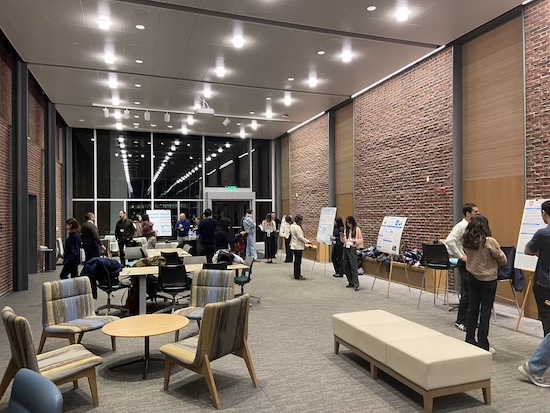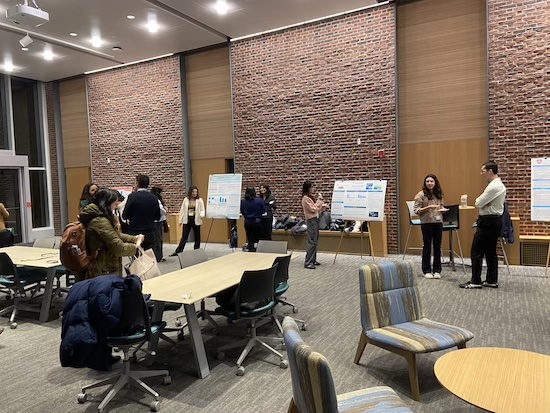
Post-Election Series
In the wake of the reelection of former president Donald Trump, the University hosted a three-day series of events exploring student and faculty research in domestic and international politics. The events began with a town hall event on Wednesday, Dec. 4, followed by a reception and student presentations the following day, and a post-election conference on Friday, Dec. 6.
The town hall, which was hosted by the Allbritton Center Civic Engagement interns, brought together three experts on political science, including two professors from the University, in the Frank Center for Public Affairs (PAC) room 100 to answer student questions about the recent election of Trump and its consequences. Although he was scheduled for the event, Colin and Nancy Campbell Professor of Global Issues and Democratic Thought Peter Rutland could not attend.
The post-election reception, which was hosted the following day on Thursday, Dec. 5, during the same time period, featured presentations from students in “Computational Media Analysis” (GOVT381) and “Public Opinion and Polling Lab” (GOVT380) on domestic politics and current research by students and faculty involved in the Wesleyan Media Project.
The last event, the 2024 post-election conference, will be hosted on Friday, Dec. 6 from 9:15 a.m. to 4:00 p.m. in PAC 100. The event will showcase the opinions of several experts and practitioners in the field to discuss the successes and failures of the Harris campaign, Trump’s incoming administration, and how both candidates reflected the changing political atmosphere of the United States. This event will cap off the Democracy 2024 program at the University, which has brought together student and faculty perspectives on domestic and international politics preceding the November presidential election.
Town Hall
The Wednesday town hall was focused around the international economy and the future role of the United States within it. Assistant Professor of Government Lindsey Dolan, Visiting Assistant Professor of Government Rudabeh Shahid, as well as Legal and Policy Director and a Senior Clinical Supervisor Thomas Becker, who previously taught public policy and human rights at Wesleyan and at Columbia Law School, discussed the future of international cooperation, monetary policy, and human rights under an administration which has promised to disrupt much of the status quo. The event was a Q&A and audience members were able to submit questions by scanning a QR code.
Dolan, whose research focuses on international political economies and organizations in the developing world, warned against proposed tariffs by the Trump administration and spoke to the continued primacy of the U.S. dollar as an international medium for exchange.
“You cannot win a trade war,” Dolan said. “Trade wars are economically destructive, and all of the economic evidence tells us that 100% of the tariffs enacted in the previous administration are borne by consumers.”
The panel also addressed the future relationship of the United States with BRICS nations, a group that includes India, China, Iran, and Egypt, and the threats to the international community that the Trump administration may pose.
“When you destroy institutions, you destroy the frameworks that have been built for a very long time to support international cooperation,” Dolan said.

Reception
The Post-Election Reception was held in the PAC forum at 5 p.m. on Thursday and showcased eight presentations by students in GOVT380 and GOVT381. Most presentations were focused on topics related to the 2024 US elections such as advertising spending, online rhetoric, and polling.
Many presenters were members of the Delta Lab, a student research group focusing on political advertising and media. Delta Lab is part of the Wesleyan Media Project, which tracks U.S. advertising spending and messaging.
“The structure of the Wesleyan Media Project’s Delta Lab is to pair student interests [with] areas of inquiry, research, [and] areas of passion, and to use data…together with the Wesleyan Media Project’s database,” Swaraj Rai ’25, who presented on ‘Political Incivility in 2022 Midterm Online Advertisements,’ said. “Getting to work with the robust data that they have on ads is an amazing opportunity.”
Although advised by a faculty member, the students, who worked on their projects over the course of the semester, had broad powers of self-determination over their topics.
“It’s directed by us, so it’s as comprehensive as we make it,” Hugo Harington ’25, who worked on ‘Non-Presidential Advertising Spending on Immigration, the Economy, and Abortion Before and After the Presidential Debate,’ said. “[Faculty sponsors] are guiding us to create good research questions. I want us to show comprehensive research, but they’re not really saying, ‘You guys are going to look at this. You guys are going to get the answer to this question.’ That was really what I took away from this, that I had to design this project. I had to make it work. I had to make it make sense. I had to make it interesting. I had to have something to take away from it.”
In addition to the presenters, the event brought together curious University students, Wesleyan professors, and scholars from other institutions.
“The Wesleyan Media Project does a great job after every election of having this conference where students get to show their work, and academics come and share their research as well,” Associate Professor of Government Logan Dancey, who advised two student presentations, said. “I think it’s a really valuable experience for the students, for the faculty and for the people that attend.”
Conference
The post-election conference will bring together faculty and researchers from 11 different academic institutions to discuss the 2024 election and the future Trump administration.
The event will have four panels with thirteen total presentations moderated by professors from the University’s Government Department.
It is sponsored by the Wesleyan Media Project, the Department of Government, the Allbritton Center for the Study of Public Life, and the Hazel Quantitative Analysis Center, and will be open to the public and free to attend.
Anabel Goode contributed to reporting and can be reached at agoode@wesleyan.edu.
Miles Craven can be reached at mcraven@wesleyan.edu.
Spencer Landers can be reached at sklanders@wesleyan.edu.



Leave a Reply